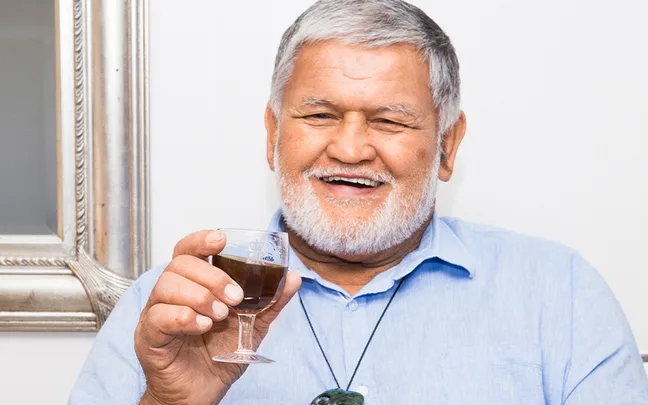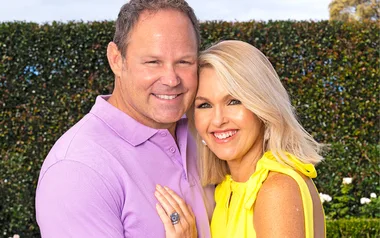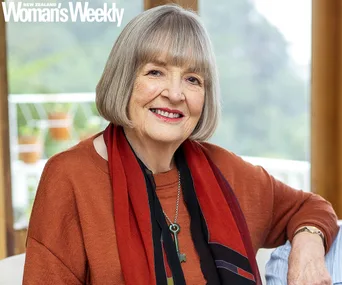By his own admission, Bill Bush was an unlikely All Black. A kina diver at primary school and a labourer at Marsden Point refinery at 14, Bill was keener on swimming.
It took the promise of a bit of kai – Fanta and a mince pie – to lure him into his first game of rugby as an 11-year-old for the Wairaka Marae third-grade side.
“I did go to Rugby Park in Whakatāne after rugby games, but it was only to collect empty bottles to earn enough to get into the local picture theatre,” he recalls. “When I was asked why I wasn’t playing rugby, I’d reply, ‘Oh, no… it’s too rough for me!’
“Honestly, for a long time I couldn’t get over how the hell I’d got into the All Blacks team! It feels like I didn’t pick rugby – it picked me.”
The reluctant player became a fearsome, revered All Black prop in the 1970s, playing 37 games between 1974 and 1979, and captaining and coaching the Māori All Blacks.
He played two tests against the Springboks in South Africa in 1976, and earned three caps against the touring British and Irish Lions the following year.
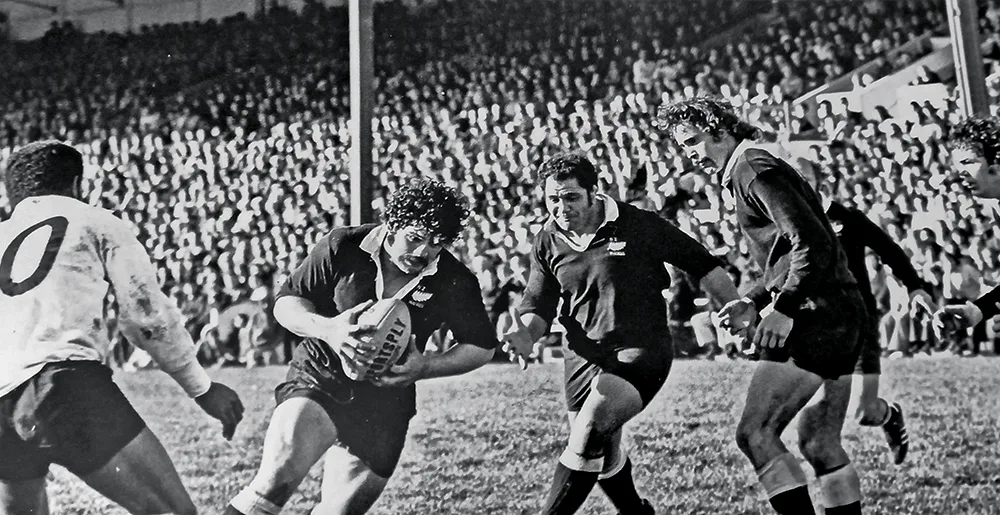
It’s a try! Billy about to cross the line for the Māori All Blacks in Wellington in 1974.
Chatting to the Weekly over Zoom from his home in Christchurch – where he lives with long-time partner Annette Nelson – the 74-year-old could have probably become a comedian too. He’s quite a hoot, retelling stories from the past.
When we talk, it’s a few days after the King’s coronation. He admits that when a shot of Buckingham Palace flashed onscreen, he shouted to Annette, “I’ve got something from there from 1978!”
It turns out while attending a royal function, the All Blacks were each given a little glass of port. Billy stuck the empty glass in his top pocket as it has a royal crest on it.
“Russ Thomas was our manager at the time and he’d jokingly said to me and [teammate] Robert Kururangi beforehand, “Don’t you two dare pinch anything!'” tells Billy, smiling.
“The butler had been talking about rugby to us and his son was mad on the game. When we left, he told me, ‘I know you’ve got a glass in your pocket, but it’ll be alright.’ So he let me have the glass as a koha [gift]for getting some All Black signatures for him.”
It’s clear Bill’s rugged charm often won over those he met and that he was one for eschewing the rules.
“When we went to Downing Street to meet the Prime Minister at the time, Harold Wilson, I had a little Kodak Brownie camera around my neck,” regales Bill. “And the bobby fella said to me, ‘You can’t take that in there!’ But Harold Wilson said, ‘Nah, he’ll be alright.’ So I got a photo of us together.”
In his recently released book Billy Bush: A Front Row View on Life, he splices the memoir with insights on rugby as much as sharing fascinating tales from his upbringing.
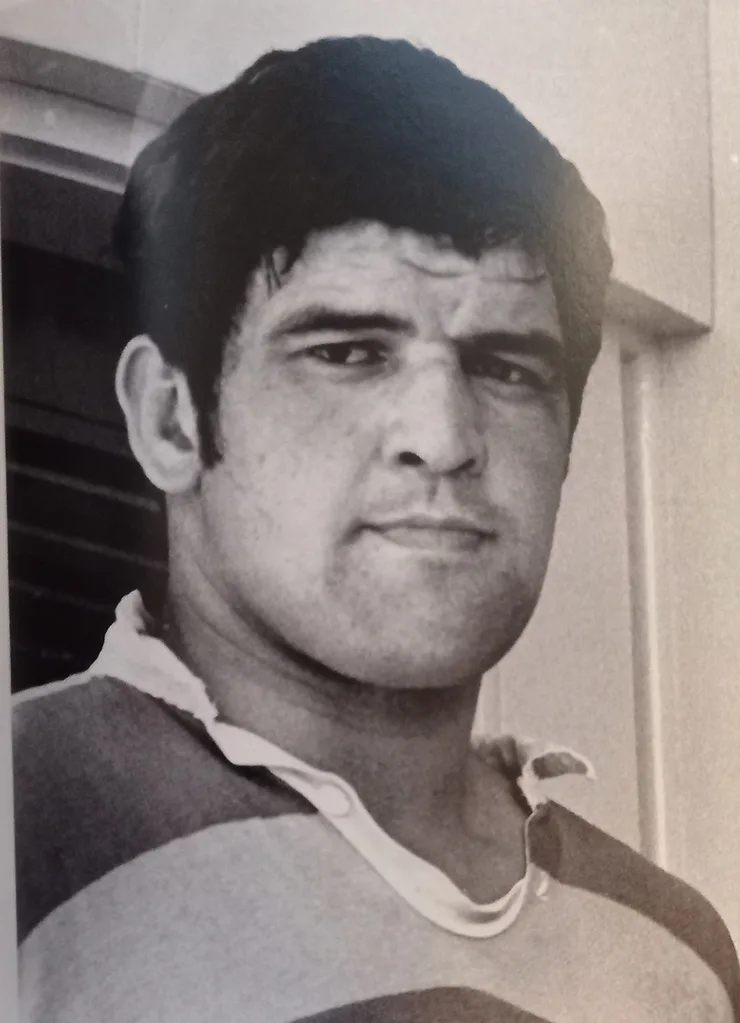
As a young boy growing up in Te Hāroto, a rural community in the Hawke’s Bay, life was spent barefoot outdoors – “walking the hills when it snowed was awful, while standing in hot cow poo was a blessing”.
In 1952, the family – including Bill’s nine siblings and one half-sister – lived in a corrugated iron bach with a dirt floor on family land. They travelled everywhere either by horse or on foot until his father managed to get his hands on an old truck.
“Living there was great,” enthuses Bill, of Ngāti Hineuru and Te Whānau ā Apanui descent. “I’d go back to that bach any day!
“It was a great life for us kids, although our mother and father must have been really down in the dumps in the situation we were in.
“We never had any power and no oven. Just a long-drop toilet and we had a well which was on top of a hill by our place. At six years old, my job was to fill up the tank with my bucket and then I went to school.
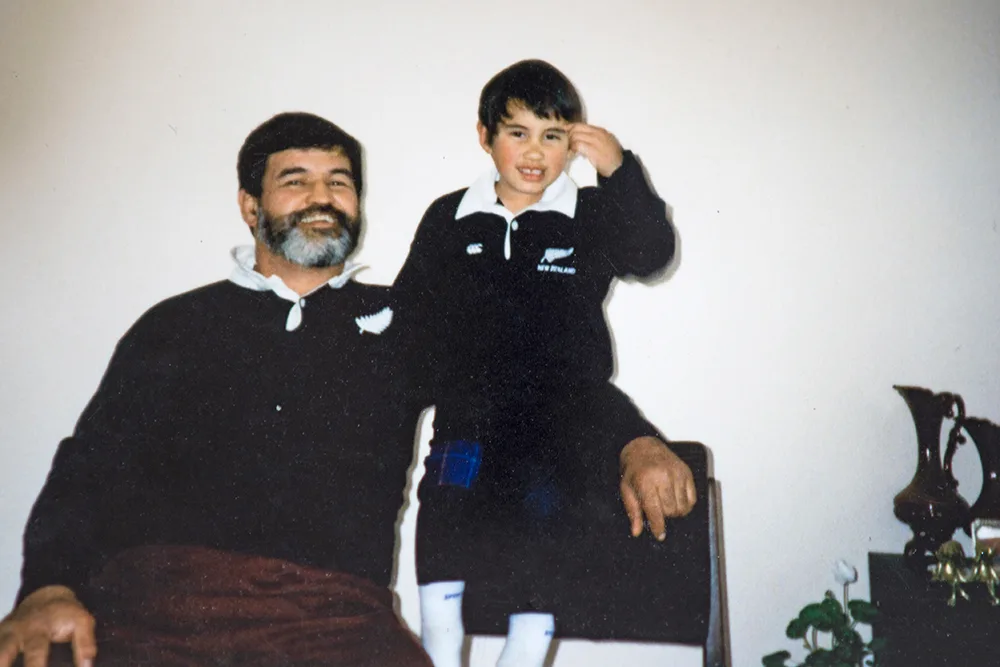
Proud son Isaac with his famous dad.
“At school, we had to have a clean handkerchief or a clean rag in our pockets, otherwise we were made to go home to get one.
“The first thing we did when we got into our class after saying a morning karakia [prayer] was to go down to the beach, just in front of the school, with our toothbrush in a tin to collect seawater so we could brush our teeth.
“The game I was good at was bullrush. I’d have my shirt off and I’d get through without getting knocked over. I was good at that. They’re all happy memories.”
When the family moved to Whakatāne, a source of income at the time came from seaweed, which Bill and his dad collected on the beach by horseback. It was then pressed into wool bales, before being sold on for around £30 (“it was a good earner”) to be made into medicines or cosmetics.
Bill, whose real name is Kingita Ngahere Te Pohe, says around this time, his local marae tried to get him to play rugby. But he was more interested in spending his weekend at the Whakatāne swimming pool.
“I’d quite often go and play with my mates down at the marae and then somebody said, ‘Oh, you get a pie and a Fanta if you join the team.’
“So I thought, ‘I’ll take the risk and get bashed around on the field for that’ because in those days, a pie cost about a shilling and a drink was one and sixpence, so it was quite expensive. I don’t know if
I was good at rugby – no one said anything.”
He didn’t play again until he was 14 and had moved to Whangārei to live with his sister. They wouldn’t let Bill into the socials at the Otangarei Rugby Club unless he joined the club and played for one of their sides.
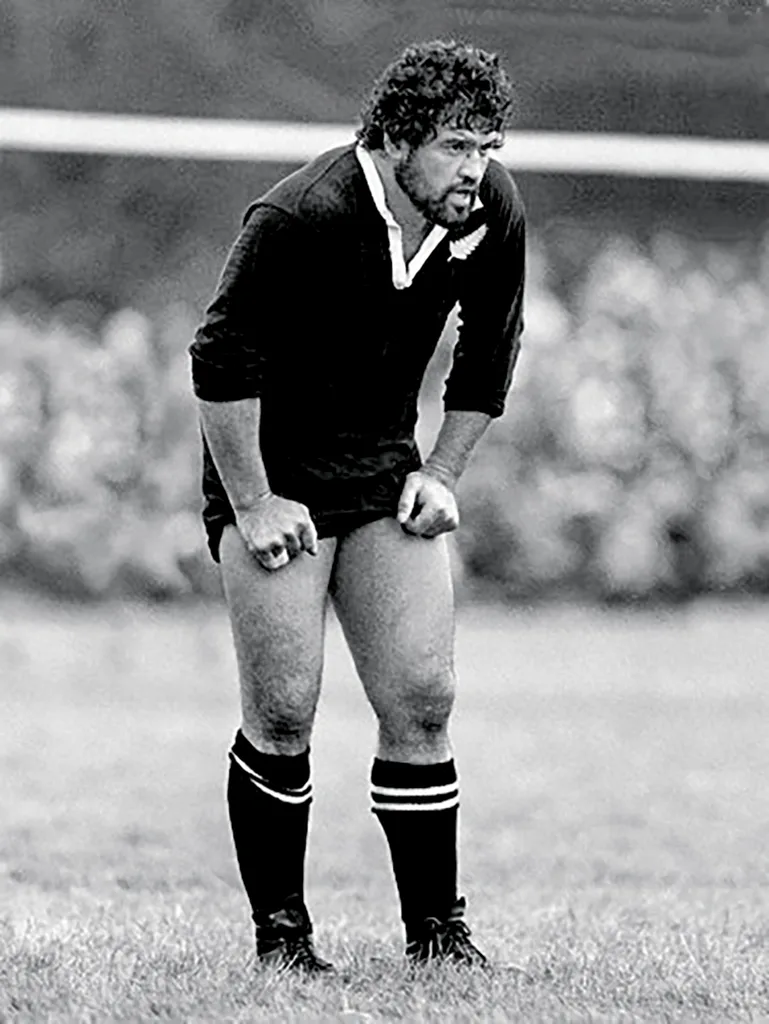
“So I reluctantly paid the three quid joining fee and they put me in the front row as a prop in their senior side.”
Five years later, in 1968, Bill visited Christchurch for the weekend.
“And I’m still here,” he laughs.
Bill first laid eyes on Annette in 1972 after she moved down to Canterbury from her hometown of Ward, in Marlborough.
“But by then I’d got into the All Blacks and there were other girls everywhere,” he chuckles.
Annette, who is of Ngāi Tahu and Ngāti Kurī descent, worked with Bill’s sister and his cousin at the toll exchange at NZ Post.
“I wasn’t interested in him – I liked his mate better, who was handsome,” she says. “Then we ran into one another again in 1985 at a party at Bill’s flat.”
“She was making eyes at me and I’m pretty sure she asked me out,” Bill pipes in.
“I don’t think I did!” she retorts. “My impression was that he was a bit too rough and ready for me. But we seemed to click, didn’t we?” says Annette, 69, smiling at Bill.
“Did we ever!” he agrees.
“Well, I’ve stayed with him for 35 years, so something must be going right!”
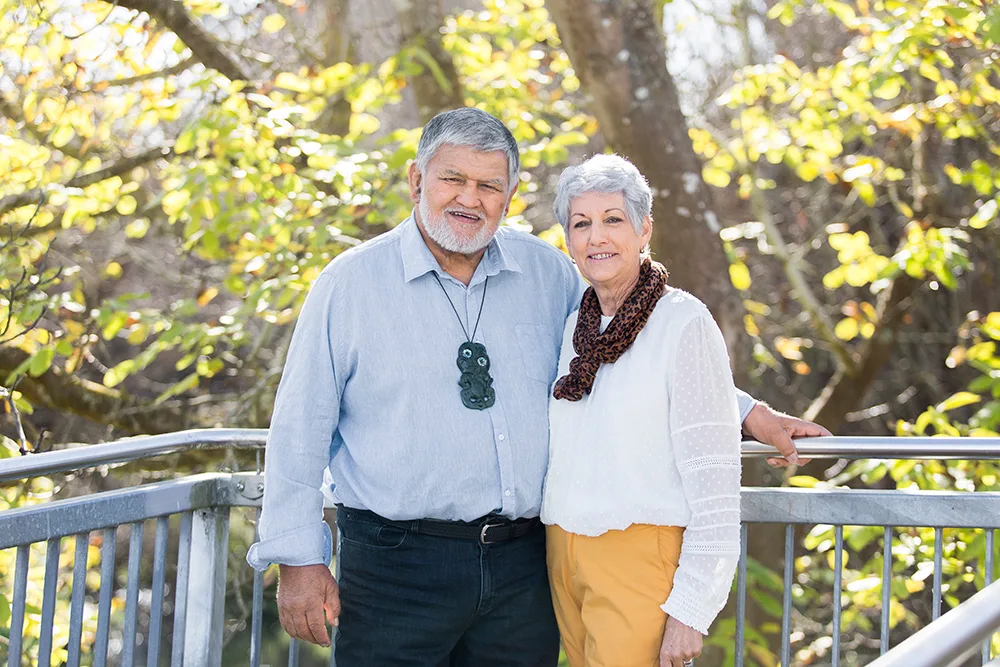
Together for 35 years, Bill and Annette aren’t keen to make it official. “But he has bought me a couple of rings!”
Although Annette had often watched rugby with her dad, she doesn’t recall ever watching Bill play.
“Back in the day, it was Sid Going who was the player to watch,” she reflects. “When my dad first met Bill, he said, ‘You’re not that Bill Bush the All Black are you?’ So Dad was a bit green, too. He asked Bill, ‘What’s your name?’ And ever the joker, he replied, ‘George. George Bush.'”
The loving couple, who have both been married before, say people are always questioning, “Why don’t you two get married?”
“And I tell them, ‘Because she keeps burning my toast and Annette says I keep boiling her eggs too hard.’
She adds, “There’s no point now. We’ve been there, done that. But he has bought me a couple of rings.”
Up until recently, Bill has been driving tour buses around the country. A bout of Covid six months ago has left him short of breath however, so he reckons retirement might be on the cards.
As he looks over his remarkable career, the father to son Isaac, 39, says he cherishes his time with another team the most.
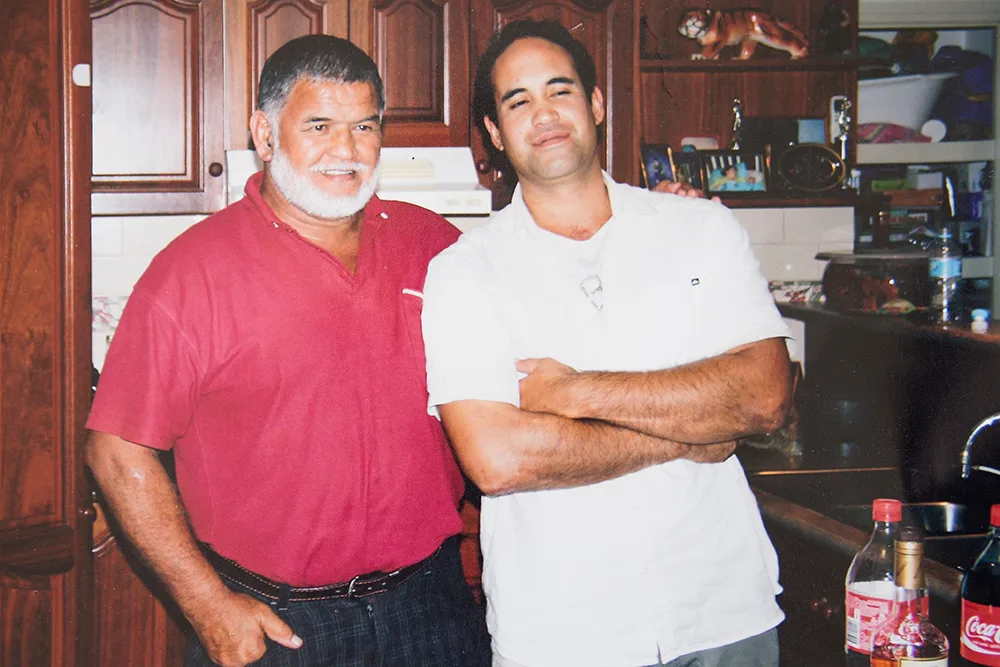
With son Issac.
“My best memories are those with the NZ Māori team because there is a totally different culture compared to the All Blacks,” explains Bill.
“Becoming an All Black was one of the high points in my life, but it was not the thing that initially inspired me, nor is it where my heart naturally lies, which is Māori rugby.
“With the NZ Māori team, it was more the culture, the wairua [spirit] and the spiritual mana that they had when you were in the side. You could feel it… it was awesome.”
Quickfire
You never learnt to speak te reo as a child – what about as an adult?
We weren’t allowed to speak it growing up, so I only know the basics of te reo. I speak Italian better, because I lived in Italy for a few years and it was the only thing I heard 24/7.
What were the perks of being an All Black?
I was of the era where players were given an allowance of $2.50 a day and a jug of beer at an after-match function. I remember being given one pair of rugby boots from Adidas, but if I wanted more, I had to pay for them myself.
Tell us about singing with Dame Kiri Te Kanawa…
Following a game with Cardiff, our coach Waka Nathan wanted us to bus four hours to London to sing as backing vocalists with Kiri, as she recorded Pokarekare Ana at the Royal Albert Hall. The players weren’t that keen on the idea because it wasn’t helping our rugby. But we went and who should be with her but Harry Secombe [of The Goons Show fame]! He was a hard-case guy. Me and about six others [including Buck Shelford] were then treated to a party at the comedian and huge rugby fan Spike Milligan’s flat in London, along with Kiri and Harry Secombe.
